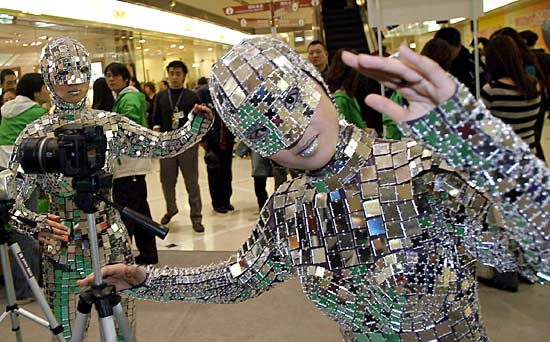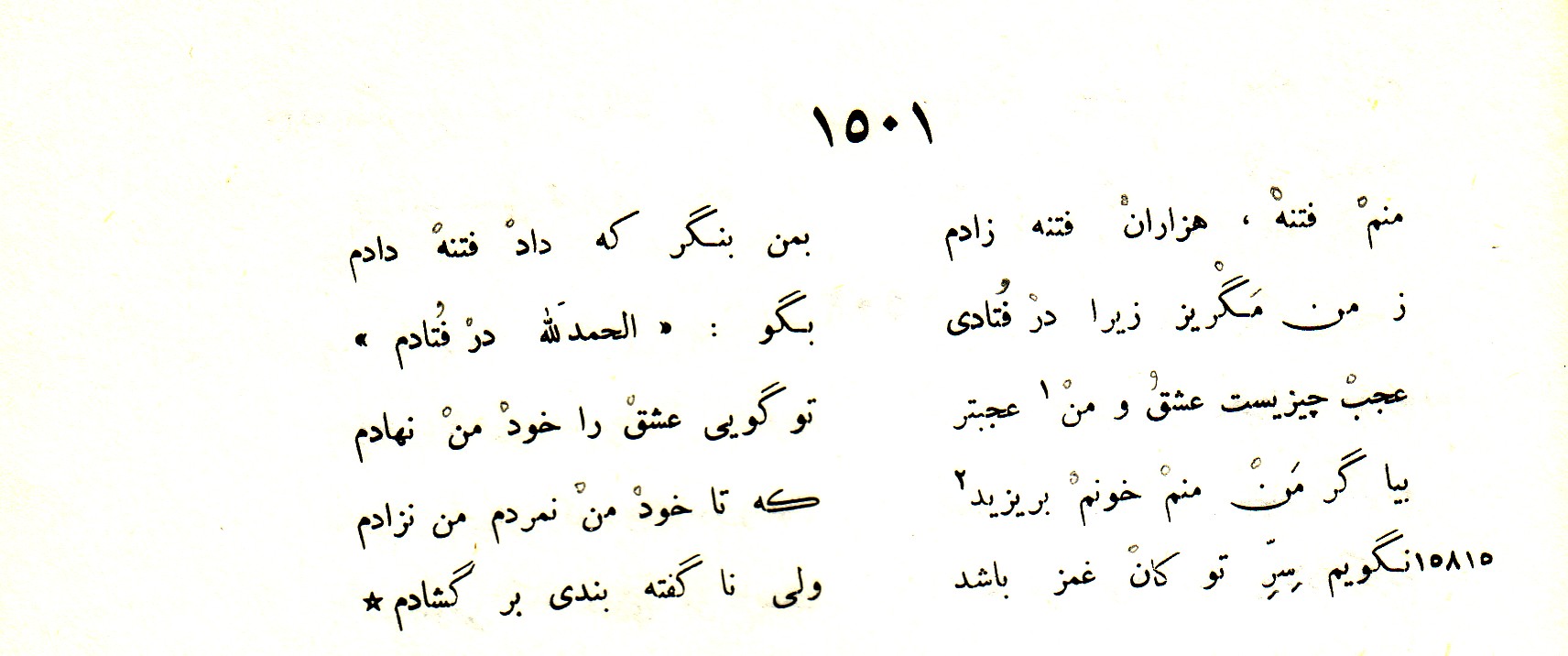Kulliyāt Shams (Divan Kabir)
Maulana Jalalid-Din Muhammad Rumi a.k.a Maulawi

1501
Discussion Join
I am the temptations, I am the trials
For I have caused thousands of temptations and trials
Look at me! Gave me trials and gave me temptations
Avoid Me not! Just because you have fallen with shame
Just say: Al-Hamdu,
humbled I am for a change
Wow! What wonder is ‘Ishq, even more wondrous I
You might have said: I planted the ‘Ishq myself!
Come my love that if I still am myself, spill my blood
For as long as I have not died, would beget no I
Shall tell no secrets of Yours, for that is disclosure
Alas! It seems though, I have let some loose!
End.
Mualawi Rumi is circling the circumference of his I-ness, looking
backwards in his life and asking: Was that I?
Were the temptations and trials for I, or I was indeed the very
temptations and trials complained about?
Is my Wujud (Being)
different than I? Or I is all that there is?
Then within the I he unearthed the ‘Isqh (Self-Entanglement)
and
bewildered by the beauty of both, the beauty of entanglement of both.
So he asks: Was it I who implanted the ‘Ishq within, or the other way
around?
Then he wonders and discovers: Is this I really my own Nafs (Self)?
Is
I roaming around the space of the Nafs (Self)
or there can be ANOTHER I
outside my own Nafs (Self)?
Finally he concludes: No, this I roaming around the Nafs (Self)
cannot
be the only I, if it is then kill me! Because of the foul things I have
arrogantly done! And killing is in order, since the outer-I cannot be
obtained
unless by the slaughter of the inner-I.
Q: Who is that outer-I?
A: Hu
is that outer-I: Indeed 'I' am
Allah, No
deity other than 'I' [20:14],
Moses was told about 'Divine I' in a dark cold night in desert!
إِنَّنِيۤ أَنَا ٱللَّهُ لاۤ إِلَـٰهَ
إِلاۤ أَنَاْ
فَٱعْبُدْنِي
By wondering about the outer-I, Rumi panics that perhaps he has lost
his Adab (Etiquette)
for the
Divine Presence! As did Moses in the mountain:
[7:143] When Moses came to the place appointed by Us, and his Lord
addressed him, He said: "O my Lord! show (Thyself) to me, that I may
look upon you." Allah said: "By no means canst thou see Me; But look
upon the mount; if it abide in its place, then shalt thou see Me." When
his Lord manifested His glory on the Mount, Hu (IT, He)
made it as dust. And Moses fell down in a swoon. When he recovered his
senses he said: "Glory be to You! to You I turn in repentance, and I am
the first to believe."
And as did Ba Yazid Bastami when he said: Subhani
(Perpetual Glory for I):
“Safeguarding the Bast (Expansion
of hope and happiness) that may get
polluted by the courage and this may cause the speaker to exit from the
Adab (Etiquette)
of ‘Ubudiaya (Servitude
for Allah) and enter into
Shat-h (Terse Spiritual Statement) as did the Shat-h of Bastami:
Subhani
(Perpetual Glory for I), and other such famous statements. This person
might be excused since his mind is lost and spiritual drunkenness has
overcome him. And this is inevitable for the person who has Bast
(Expansion
of hope and happiness) while in Mushahadah (Observation) of the
Divine Grandiose and Glory. Safeguarding these situations against
pollution by courage and rudeness is necessary.”
Source: Asmā’ul Husnā (Beautiful Divine Names), Chapter ‘Ijrā’
Asmā’ul
Lāh ‘Alā Zāhiruhā, by Jauziah (Abu-Bakr Ibn Qayyim)
Now you know why you are ordered to wash certain way prior to prayers,
dress this way and cover that way, not that there is anything spiritual
about the facial hair or the scarves, but to get you into the habit of
respecting the Adab (Etiquette) for the Divine Presence if and when
made present.
©
2007-2002, Dara O. Shayda


